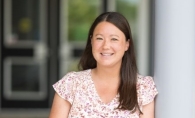
White Bear Lake native Sean Kenny didn’t set out to become an educator and advocate for those with autism. But that’s the important role he has filled for the past 15 years, in making annual visits to speak with fourth grade classes at Lincoln Elementary School about his own experiences living with autism.
The idea originated with Sean’s aunt, Nancy Rausch, a paraprofessional at the school, who asked her nephew to come in and speak to several fourth grade classes.
A psychologist there had recognized, in fourth grade, “kids were starting to notice differences, and in some cases judging, and even venturing into bullying,” says Sean’s mother, Sherrie Kenny.
That first time in front of all the kids, Sean says, “I was a little nervous, but I got through it.” He was a big hit with the students and teachers, and has returned every year since, not only during Disability Awareness Month, but also at various other times during the school year.
Sherrie says, “it was really important to start by helping him get comfortable sharing information with the students.” Sherrie or her husband, Tom, accompanies Sean to the classroom, and open the conversation by talking about what autism is.
One thing she’s noticed is more students and families have apparently been impacted by autism, as the condition has become more commonly diagnosed in Minnesota.
The Centers for Disease Control did not sanction autism as an official diagnosis until 1973, just four years before Sean was born, says Sherrie, a longtime Autism Society of Minnesota volunteer, who served as the society’s executive director for several years.
A topic that evokes a big response is Sean’s discussion of his experiences as a successful Special Olympics athlete. He shows them medals he won competing in national competitions in Seattle (golf) and Colorado (downhill skiing), and talks about the group home in North Oaks, where he lives.
Over the years, the school visits have evolved as Sean has become more comfortable speaking with the classes, and the students’ questions have become more pertinent and mature, Sherrie says. “When kids ask Sean ‘What's hard for you?’” the Kennys like to steer the conversation to the idea that “regardless if we have a disability or not, we all need support,” she says.
One of the early questions: “Do you wish you were normal?”
“The first time Sean heard that, I thought he would be puzzled. But he answered brilliantly: ‘I'm not sure what normal is, but I like my life.’” Sean has also shared a few negative experiences from his own fourth grade year, when kids who were less informed about autism tested his reactions to a punch on the arm, for example. He conveys the message that “kids shouldn’t be laughed at,” Sherrie says.
Fourth grade teacher Teresa Ogden—who estimates Sean has shared his message with more than 1,000 kids and their families—appreciates that, rather than focusing on what he can’t do because of his autism, “Sean talks about his abilities, talents and experiences he’s had in Special Olympics, his job. Focusing on what he can do is a huge piece for the kids,” Ogden says. “It gets kids thinking about what that means when people have challenges and how they can be kinder, more thoughtful, and what they can do to recognize and validate people. Sean has incredible talent with that. He has a presence and a genuineness, because everything he does is from the heart.”
At Kowalski’s in White Bear Lake, where he has worked for more than 15 years, Sean often encounters students and families who know him from the school program. When the Kennys and their son are at church or at a local restaurant, “there is hardly a time when we are not stopped by someone to say ‘hello’ to Sean,” Sherrie says. “So, he has made an impact in the community.”









